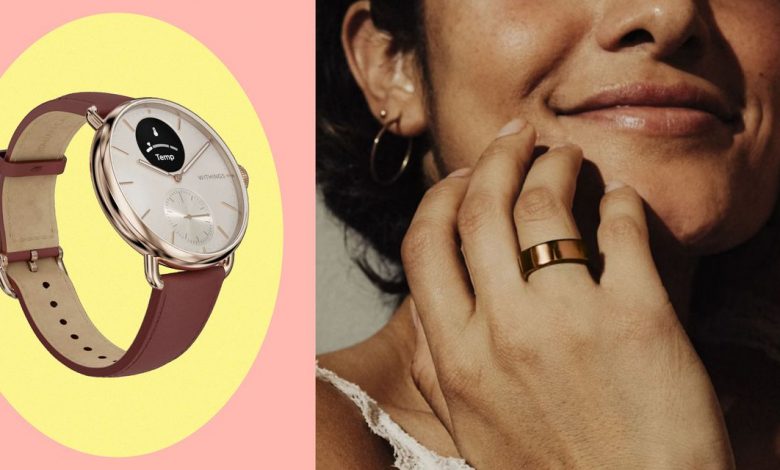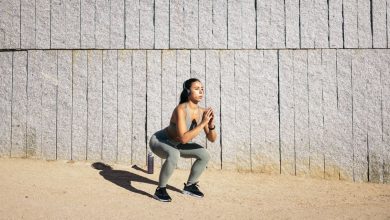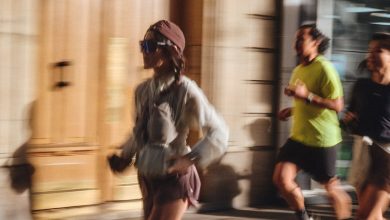These Fitness Trackers Will Help You Train Smarter (Not Harder)

The world of wearables is constantly evolving—sorting through all the options out there to find the best fitness tracker can be overwhelming. It’s not exactly the worst problem to have: It’s great that this tech is always improving, with new ways of measuring key wellness metrics (HRV! Sleep score! Recovery!) at our fingertips (or wrists). But still, it can leave you wondering which numbers really matter. And how do you find the device that’ll actually help you get the most out of your workouts?
To cut through the noise, we asked fitness experts which smartwatches and rings they recommend for every type of active lifestyle. We also tested some for ourselves to see if they really live up to the hype. Whether your goal is to set a new PR, get eight hours of sleep a night, or squeeze those 10,000 steps in every day, there’s a fitness tracker that can help you achieve it below.
Our top picks
- Best Overall: Garmin Venu 3S, $450
- Best for Beginners: Fitbit Charge 6, $160
- Best for Runners: Garmin Forerunner 955 Solar, $600
- Most Versatile: Coros Pace Pro, $349
- Best for Outdoor Adventures: Apple Watch Ultra 2, $790
- Best Budget Pick: Fitbit Inspire 3, $100
- Best Sleep Tracker: Whoop 5.0, $239
- Best Smart Ring: Oura Ring 4, $349
- Most Stylish: Withings ScanWatch 2, $370
Shop the best fitness trackers
After consulting experts and testing some trackers ourselves, we’ve rounded up our favorites all in one place.
Best Overall: Garmin Venu 3S
“If you’re an everyday, at-home athlete, I think the Venu 3S is one of the best on the market for good, well-rounded measurements,” Lindsey Bomgren, NASM-CPT, a personal trainer and the founder of online fitness studio Nourish Move Love, tells SELF. She uses one herself: “[It] has a nine- to 10-day battery life, so I can go on a trip and not have to pack my charger,” she says.
We’re fans too: While this watch earned a spot in SELF’s 2024 Home Fitness Awards, it was an editor favorite long before then. When SELF’s fitness director Christa Sgobba, CPT, tested the Garmin Venu 3S, she was impressed by how much data it collected—and how accurate her numbers were.
“The Venu 3 is definitely pricey, but it also provides a solid bang for its buck,” she wrote in her review. “I can’t think of anything it’s missing that’d tempt me to look for an upgrade in a couple of years—so it’s the kind of fitness tracker that’ll keep you in the know for the long haul.” She particularly loved the Venu’s strength training features and raved about its in-depth recovery metrics, which include personalized push and rest day recommendations.
Screen: Touchscreen | Battery life: Up to 10 days | Water resistance: Up to 50 meters | Subscription cost: None
Best for Beginners: Fitbit Charge 6
This lightweight Fitbit has a user-friendly design and an impressive range of statistics. It has plenty of familiar features like activity tracking (including heart rate, distance, steps, and calories burned), sleep monitoring, and built-in GPS. But you’ll also get touchless pay and turn-by-turn directions from Google Maps when you’re on the go. You can even see VO2 max estimates (a number that shows how effectively your body uses oxygen while you exercise), a daily stress score, and notifications from Gmail, to help you stay in the loop.
The Charge 6 is a great value: The price also includes six months of a Fitbit premium subscription, which provides advanced fitness tracking features and access to workout classes via the Fitbit app. It’s no wonder Ollie Thompson, CPT, a trainer in London, tells SELF that Fitbits are his first pick for beginners—or that this one is the brand’s bestselling watch.
Screen: Touchscreen | Battery life: Up to 7 days | Water resistance: Up to 50 meters | Subscription cost: Optional premium subscription (free for first six months, then $80/year)
Best for Runners: Garmin Forerunner 955 Solar
Garmin
Forerunner 955 Solar
Whether you’re a new runner, a 10-time Boston Marathon qualifier, or somewhere in between, the Garmin Forerunner is one of the best running watches around. Running coach Amanda Nurse tells SELF that, while Garmins are generally great at giving accurate heart rate and GPS data, she loves the 955 Solar because it’s loaded up with features like race predictions and VO2 max estimates. It’ll even count every one of her strokes when she’s swimming.
It also has helpful safety features: “One time I fell off my bike, and my watch put out an alert to my husband,” Nurse says. Plus, the 955 Solar’s solar charging feature means its battery life is among the best around. “I tend to not take it off unless I’m going out to a fancy event (it’s not cute for that), but I wear it all other times,” she says.
If you’re looking for a less expensive alternative, Amanda Brooks, ACE-certified personal trainer and running coach, tells SELF she recommends the Garmin Forerunner 55. She says it provides “all of the basic data that you need, from distance to heart rate to programming workouts.” It also offers cadence alerts and race time predictions, based on your training.
Screen: Touchscreen | Battery life: Up to 20 days | Water resistance: Up to 50 meters | Subscription cost: None
Most Versatile: Coros Pace Pro
Although it’s a newer brand, Coros has quickly gained a reputation for making activity trackers with excellent battery life and great features at more reasonable price points. Our tester found that the Pace Pro’s AMOxLED screen clearly displays stats during workouts—whether you’re out at night or in bright sunlight—with fun graphics that let you quickly check your heart rate zone (read: no need to do mental math while you’re on the run).
Downloadable maps, race predictions, expert-created training plans, build-your-own workouts, and loads of insights to scroll through make the Pace Pro one of the best training buddies you can find. Although our tester found that the sleep tracking isn’t the most accurate, she was impressed by its 20-day battery life. Just be patient while poking around: She noticed that the interface isn’t always the most intuitive, so it may take you a few minutes to find and access all of its helpful numbers.
Screen: Touchscreen | Battery life: Up to 20 days | Water resistance: Up to 50 meters | Subscription cost: None
Best for Outdoor Adventures: Apple Watch Ultra 2
If your workouts often take you outdoors, it could be worth investing in the Apple Watch Ultra 2. A highly dust- and water-resistant case and super bright screen help protect the tech inside, even when the weather (or your plans) change suddenly. Runners will also appreciate that it can automatically detect when you’re at a track and provide accurate pace and distance stats. And hikers will enjoy downloading offline maps and saving custom trail routes right to your wrist.
The watch even works as a dive computer up to 40 meters under water. In her review of the original Apple Watch Ultra, personal trainer Amy Eisinger, MA, CPT, wrote, “I love that I’m able to track my workouts, sleep, health, texts, music, and everything else, all from a single device.” She added, “this will easily be my new go-to for long runs, quick workouts, and every other part of my active (and slightly sleepless) life.”
Screen: Touchscreen | Battery life: Up to 72 hours | Water resistance: Up to 100 meters | Subscription cost: Optional Apple Fitness+ membership (free for the first month, then $80/year)
Best Budget Pick: Fitbit Inspire 3
Fitbit
Inspire 3 Health & Fitness Tracker
While some of the best fitness trackers today are basically mini-computers on your wrists, there’s also something to be said for more basic options. If you’re looking for your first fitness tracker—or you aren’t interested in a bunch of extra bells and whistles—SELF’s senior commerce editor, Sarah Felbin, says the Inspire 3 fitness band is a great option.
“I’ve had my Inspire 3 for a few years now—I love that it’s small and low-profile, but still tracks a ton of data,” she says. “The Fitbit app is easy to use and allows me to check my steps, heart rate, sleep, and more at a glance.” She recommends springing for the paid Fitbit membership (it’s $80 per year) if you’re looking for detailed sleep tracking or workout programming, but adds that you can still get a lot out of this watch without it. Her favorite feature? The alarm, which gently vibrates on your wrist to wake you up in the morning or reminds you to get up and stretch during the day.
Screen: Touchscreen | Battery life: Up to 10 days | Water resistance: Up to 50 meters | Subscription cost: Optional premium subscription (free for the first six months, then $80/year)
Best Sleep Tracker: Whoop One
Lots of top athletes like Michael Phelps and LeBron James use Whoop, a tracker that focuses on an often forgotten part of training: recovery. Strength coach Ava Fagin, CSCS, director of sports performance at Cleveland State University, tells SELF she wears hers 24/7 to keep tabs on her sleep and optimize her rest days. The tracker’s Strain Coach takes into account your heart rate variability (HRV), resting heart rate (RHR), and hours of sleep each day, then spits out a number. That result helps Fagin decide how vigorously to exercise each day—or when to rest instead.
Marcel Dinkins, CSCS, personal trainer and Peloton fitness instructor in NYC, tells SELF that Whoop has helped her “learn to properly stagger workouts, to take advantage of scheduling naps, and really prioritize proper recovery in between sessions so I can continue to go hard when it’s time to train.”
Not a fan of always having something on your wrist? Whoop offers clothing and accessories that let you position the tracker in your bra or underwear, so you can find the most comfortable method that works for you.
Screen: None; app only | Battery life: Up to 14 days | Water resistance: Up to 10 meters | Subscription cost: Membership required ($199/year)
Best Smart Ring: Oura Ring 4
If you want to learn more about your sleep patterns, but you don’t love the idea of having a tracker on your wrist at all times, check out the Oura Ring 4. “That’s a less obtrusive thing to wear,” Lisa Gualtieri, PhD, a digital health professor at the Harvard T.H. Chan School of Public Health and founder of Recycle Health (an organization that collects fitness trackers to donate), tells SELF. The tiny sensors around your finger can detect your sleep stages, stress levels, and movement—then, the app turns this detailed health data into personalized fitness and recovery recommendations.
Our tester says her Home Fitness Award-winning Oura Ring is her new favorite sidekick, even beyond workouts: “So far, I have a love-hate relationship with my Oura ring,” she says. “Love: when it tells me I’ve hit my activity goal for the day. Hate: when it lowers my sleep score for going to bed too late. But really, I’m impressed by how much it’s picked up on. It could tell when I was super stressed on a travel day, and it even let me know that I was showing ‘minor signs’ of strain on a day I was feeling under the weather.” We’d say that’s pretty smart.
Screen: None; app only | Battery life: Up to 8 days | Water resistance: Up to 100 meters | Subscription cost: Membership required to access most features (free for the first month, then $70/year)
Most Stylish: Withings ScanWatch 2
As someone who’s tried lots of trackers, Dr. Gualtieri says she’s stuck with this one from Withings the longest. That’s because it has two very practical perks: a battery that lasts a full month between charges and a watch face that blends in with any outfit. “It’s convenient because I often want to glance at my wrist and see the time—I don’t want to have to push a button or have a complicated display,” she says.
But unlike your average timekeeper, Withings’ bestselling ScanWatch 2 also picks up on your heart rate, blood oxygen levels, body temperature, activity, menstrual cycle, and sleep—and will give you a heads up if something seems off. Most of the display is taken up by the analog clock, so you can only peek at one metric at a time (which can be limiting during a workout, where you might want to always see pace and distance, for instance).
But you can go deeper in the app, which offers plenty of data for free. Or, you can upgrade to Withings Plus for exclusive content like recommended workouts, recipes, and feedback on your metrics from a certified cardiologist.
Screen: Analog | Battery life: Up to 30 days | Water resistance: Up to 50 meters | Subscription cost: Optional Withings Plus subscription ($100/year)
What to consider before buying a fitness tracker
How often you need to charge a tracker might seem like a minor detail, but it can mean the difference between a wearable you actually use and one you don’t bother with. Dr. Gualtieri says that a short battery life is one of the biggest reasons people stop using their fitness watch—so make sure yours fits your lifestyle. Does it need more juice every night, or just once in a while? And how long does it take to fully charge?
Yes, activity trackers can be very expensive—and more advanced features typically mean a bigger investment. But there are also a number of budget-friendly options that cost less than a pair of running shoes. Most brands offer a range of models from entry-level to high-end, Bomgren says. When you’re figuring out how much you want to spend, just remember to calculate the cost of the device itself, plus any monthly subscriptions required to use it.
Not all wearables track the same data points, so consider which metrics are most important to you. For instance, if you’re a swimmer, you might want a watch that can count every stroke. Or if sleep is your biggest concern, consider a fitness tracker like the Whoop or Oura Ring that will dive deep into those nighttime metrics. You can also find watches that let you stream music, give turn-by-turn navigation, or automatically alert a loved one if you fall. “There are so many different options these days, depending on what you care about,” Nurse says.
While some people only wear a fitness tracker during workouts, most today are designed to stay on your hand or wrist 24/7. So, look for something light and sleek that you can set and forget. Consider whether a smaller watch case or a fabric vs. a silicone band might be more comfortable on your wrist, or if you’d prefer a smart ring instead.
While no tracker is perfect, yours should provide info that’s precise enough to give you useful insights. “It’s widely known that the data wearables track isn’t always 100% accurate, but where these devices really shine is when we consider data over the long-haul,” Thompson says. It’s those trends over time that can help you measure your progress and notice when you deviate from your baseline.
Cardiac surgeon Basel Ramlawi, MD, adds that, while many trackers have fairly accurate heart rate sensors that can deliver some solid stats to you and your provider, they’re not super sophisticated and shouldn’t be relied on for diagnostics without additional tests by your doctor.
Frequently asked questions about fitness trackers
What metrics can a fitness tracker collect?
Fitness trackers can track data like your steps, pace, heart rate, activity time, menstrual cycle, and more. Many can also log your sleep, breaking down how much time you spend in various sleep stages and your overnight heart rate variability. Others show advanced health and well-being metrics like your blood oxygen level (spo2), respiratory rate, and skin temperature—some can even take an ECG or give you an overall “stress score.”
What are the different types of fitness trackers?
Fitness trackers can range from simple pedometers to mini-computers on your wrist. The most basic ones will mainly record your step count and maybe your heart rate. GPS tracking sports watches will also calculate your distance and pace, which makes them ideal for running and cycling.
A heads up: Smartwatches like Apple Watches or Google Pixel Watches can offer more connectivity, like the ability to answer phone calls or allow you to pay for your post-run coffee right from your wrist, but they might not have as many workout-specific settings. Some “put smartwatch features first, activity tracking second,” Bomgren says.
Do doctors recommend fitness trackers?
When it comes to health monitoring, Dr. Gualtieri says that Apple watches are getting closer and closer to meeting the standards of medical-grade devices. For instance, they’re now FDA-approved to detect sleep apnea. Many also have an ECG app, irregular heart rate notifications, ovulation estimates, and more.
Doctors say fitness trackers can be a smart way to take a proactive role in your own healthcare, particularly if you use your tracker as a heart rate monitor. “It allows people to be aware of where their heart is—it brings it front and center,” Dr. Ramlawi says. Some Fitbits and Apple Watches can even detect signs of common heart problems like atrial fibrillation (aFib, an arrhythmia), allowing doctors to treat it early. Dr. Ramlawi recommends getting a tracker that allows you to share a report of any irregular events with your provider, if this is a feature you’re interested in. (Just remember that fitness trackers aren’t a replacement for regular check-ups with your cardiologist or another provider.)
Related:
- Snooze Better and Longer With the Best Sleep Trackers
- We’ve Tested Home Gym Equipment for Years—This Is the Best of the Best
- Our Favorite Running Shoes for Easy Jogs, Marathons, and Everything In Between
Get more of SELF’s great product recommendations delivered right to your inbox (for free!).



